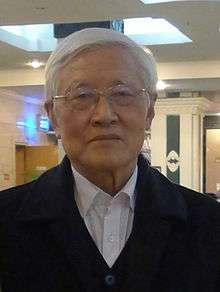Yu Mao-Hong
Yu Mao-Hong (Chinese: 俞茂宏, b. 1934) is a Chinese engineer and a university professor. He is noted for his research on the strength hypotheses and yield surfaces of isotropic materials.[1] [2] [3] [4] His unified strength theory (UST) has found acceptance as generalized classical strength theory.[5][6] It contains the following nonparametric strength theories and criteria:
- the normal stress theory (the William John Macquorn Rankine hypothesis),
- the Tresca yield criterion,
- the von Mises yield criterion (the Sokolovsky[7] regular dodecagon in the π-plane), and
- the Schmidt-Ishlinsky[8][9] yield criterion

Yu Mao-Hong (2015)
and three one-parameter criteria: the Mohr–Coulomb theory (Single-Shear-Theory (SST)), the Sdobyrev[10] (Pisarenko-Lebedev)[11][12] criterion, and the Twin-Shear-Theory (TST). The Unified Yield Criterion (UYC) as a part of the UST is used in the theory of plasticity (physics).
Curriculum vitae
- 1951 - 1955 student at Zhejiang University, Hangzhou
- 1955 - 1959 assistant at Zhejiang University, Hangzhou
- 1960 - 1966 lecturer at Xi'an Jiaotong University, Xi'an
- 1978 - 1980 lecturer at Xi'an Jiaotong University, Xi'an
- 1981 - 1984 associate professor at Xi'an Jiaotong University, Xi'an
- 1985 till now professor at Xi'an Jiaotong University, Xi'an
Selected books
- Unified Strength Theory and Its Applications, Second Edition. Mao-Hong Yu, Springer, Singapore, 2017, ISBN 978-981-10-6246-9, ISBN 978-981-10-6247-6
- Computational Plasticity: With Emphasis on the Application of the Unified Strength Theory (Advanced Topics in Science and Technology in China). Mao-Hong Yu, Jian-Chun Li, Springer, Berlin, 2012, ISBN 978-3-642-24589-3
- Generalized Plasticity. Mao-Hong Yu, Guo-Wei Ma, Hong-Fu Qiang, Yong-Qiang Zhang, Springer, Berlin, 2010, ISBN 978-3642064203
- Structural Plasticity: Limit, Shakedown and Dynamic Plastic Analyses of Structures (Advanced Topics in Science and Technology in China). Mao-Hong Yu, Guo-Wei Ma, Jian-Chun Li, Springer, Berlin, 2009, ISBN 978-3-540-88151-3
- Generalized Plasticity. Mao-Hong Yu, Guo-Wei Ma, Hong-Fu Qiang, Yong-Qiang Zhang, Springer, Berlin, 2006, ISBN 3-540-25127-8; 978-3-540-25127-9
- Unified Strength Theory and Its Applications. Mao-Hong Yu, Springer, Berlin, 2004, ISBN 3-540-43721-5
- Computational Plasticity (in Chinese). Mao-Hong Yu, Li Jian Chun, Springer, Berlin, 2000
- Engineering Strength Theory (in Chinese). Mao-Hong Yu, Higher Education Pressress, Beijing, 1999
- Researches on the Twin Shear Stress Strength Theory (in Chinese). Mao-Hong Yu, Xi'an Jiaotong University Press, Xi'an, 1988
Selected articles
- General behaviour of isotropic yield function (in Chinese: 各向同性屈服函数的一般性貭 - 俞茂鋐. Mao-Hong Yu, Scientific and Technological Research Paper of Xi'an Jiaotong University, Xi'an, 1961, pp. 1–11
- Brittle fracture and plastic yield criterion (in Chinese: 各向同性屈服函数的一般性貭 (双切屈服准則及其流动規律). Mao-Hong Yu, Scientific and Technological Research Paper of Xi'an Jiaotong University, Xi'an, 1962, pp. 1–25
- Twin shear stress yield criterion. Mao-Hong Yu, Int. J. Mech. Sci., 1(25), 1983, pp. 71–74
- Advances in strength theories for materials under complex stress state in the 20th century. Mao-Hong Yu, Applied Mechanics Reviews, 5(55), 2002, pp. 169–218
- Linear and non-linear Unified Strength Theory (in Chinese). Mao-Hong Yu, Journal of Geotechnical Engineering, 4(26), 2007, pp. 662–669
- Basic characteristics and development of yield criteria for geomaterials. Mao-Hong Yu, Xia, G., Kolupaev, V. A., Journal of Rock Mechanics and Geotechnical Engineering, 1(1), 2009, pp. 71–88, doi:10.3724/SP.J.1235.2009.00071
- Unified Strength Theory (UST). Mao-Hong Yu, Rock Mechanics and Engineering, Volume 1: Principles, Editor: Xia-Ting Feng, pp. 425–450, CRC Press, London, 2017, ISBN 1138027596
Awards
- 2011: National Natural Science Award, China
- 2014: Excellent Article Award, Journal of Rock mechanics and Geotechnical Engineering
- 2015: Ho Leung Ho Lee Foundation Price, China
References
- Teodorescu, P.P. (Bucureşti). (2006). Review: Unified Strength Theory and its applications, Zentralblatt MATH Database 1931 – 2009, European Mathematical Society, Zbl 1059.74002, FIZ Karlsruhe & Springer-Verlag
- Fan, S. C., Qiang, H. F. (2001). Normal high-velocity impaction concrete slabs-a simulation using the meshless SPH procedures. Computational Mechanics-New Frontiers for New Millennium, Valliappan S. and Khalili N. eds. Elsevier Science Ltd, pp. 1457-1462
- Zhang, C. Q., Zhou, H., Feng, X. T. (2008). Numerical format of elastoplastic constitutive model based on the unified strength theory in FLAC3D (in Chinese). Rock and Soil Mechanics, 29(3), pp. 596-601
- Zhao, G.-H.; Ed., (2006) Handbook of Engineering Mechanics, Rock Mechanics, Engineering Structures and Materials (in Chinese), China's Water Conservancy Resources and Hydropower Press, Beijing, pp. 20-21
- Altenbach, H., Bolchoun, A., Kolupaev, V.A. (2013). Phenomenological Yield and Failure Criteria, in Altenbach, H., Öchsner, A., eds., Plasticity of Pressure-Sensitive Materials, Serie ASM, Springer, Heidelberg, pp. 49-152. ISBN 978-3-642-40944-8
- Kolupaev, V. A., Altenbach, H. (2010). Considerations on the Unified Strength Theory due to Mao-Hong Yu (in German: Einige Überlegungen zur Unified Strength Theory von Mao-Hong Yu), Forschung im Ingenieurwesen, 74(3), pp. 135-166. doi:10.1007/s10010-010-0122-3
- Kolupaev, V. A., Yu, M.-H., Altenbach, H. (2013). Yield Criteria of Hexagonal Symmetry in the π-plane, Acta Mechanica, 224(7), pp. 1527-1540. doi:10.1007/s00707-013-0830-5
- Schmidt, R. (1932). Über den Zusammenhang von Spannungen und Formänderungen im Verfestigungsgebiet. Ingenieur-Archiv, 3(3), pp. 215-235.
- Ishlinsky, A. Yu. (1940). Hypothesis of Strength of Shape Change (in Russ.: Gipoteza prochnosti formoizmenenija). Uchebnye Zapiski Moskovskogo Universiteta, Mekhanika, 46, pp. 104-114.
- Sdobyrev, V. P. (1959). Criterion for the long term strength of some heat-resistant alloys at a multiaxial loading (in Russ.: Kriterij dlitelnoj prochnosti dlja nekotorykh zharoprochnykh splavov pri slozhnom naprjazhennom sostojanii). Izvestija Akademii Nauk SSSR, Otdelenie tekhnicheskikh Nauk, Mechanika i Mashinostroenie, 6, pp. 93-99.
- Pisarenko, G. S., Lebedev, A. A.. (1969). Deformation and Fracture of Materials under Combined Stress (in Russ.: Soprotivlenie materialov deformirovaniju i razrusheniju pri slozhnom naprjazhennom sostojanii). Naukowa Dumka, Kiev.
- Pisarenko, G. S., Lebedev, A. A.. (1976). Deformation and Strength of Materials under Complex Stress State (in Russ.: Deformirovanie i prochnost' materialov pri slozhnom nap\-rjazhennom sostojanii). Naukowa Dumka, Kiev.
This article is issued from Wikipedia. The text is licensed under Creative Commons - Attribution - Sharealike. Additional terms may apply for the media files.